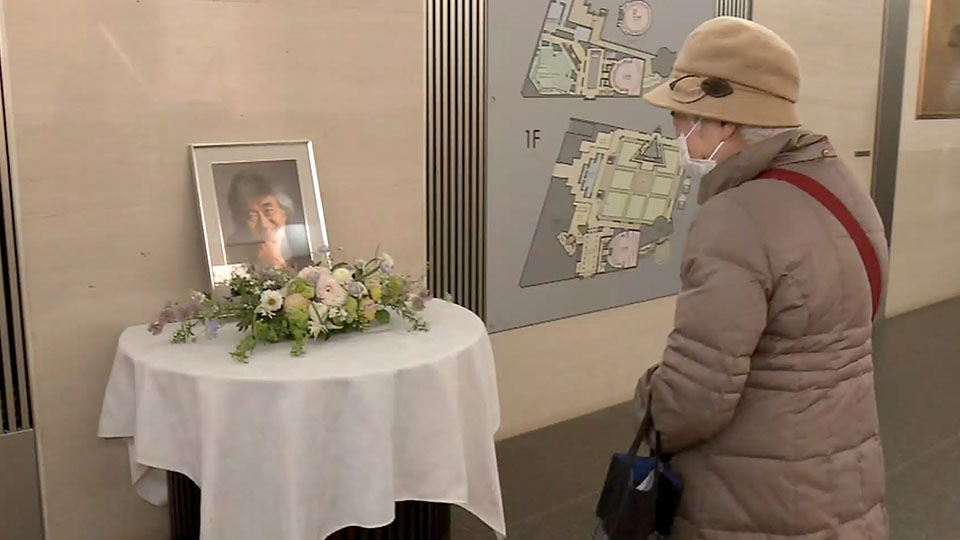Musical world mourns Ozawa's death
Members of the Boston Symphony Orchestra, where Ozawa served as music director for nearly 30 years, observed a minute of silence before their performance on February 9.

A photo of Ozawa was put on display in the lobby of the orchestra hall. Audience members reflected on their memories of him.
"He was the first person to not wear a black tie and have a different kind of outfit," said one person. "He was young and enthusiastic."
"The passion of watching him direct was always so much fun," said another. "His expressions and the way he acted, he was tremendous."
The orchestra issued a statement on Ozawa's death, saying he was "a kind and thoughtful humanitarian; a musical genius who combined balletic grace at the podium with a prodigious memory."
Ozawa also performed countless times in France and received the country's highest order of merit, the Legion of Honor. Leading French newspaper Le Monde described him as the "first Asian to break through as a conductor in the West."
Ozawa was born in what is now Shenyang in northeastern China in 1935. State-run China Central Television reported on his early childhood in Beijing and how he returned to the country many times throughout his career for performances.
A glittering career
Ozawa played piano from a young age. He started taking conducting classes in high school with Saito Hideo, who he also studied under at the Toho Gakuen School of Music in Tokyo as a college student.
Ozawa moved to France at 23 to further his musical training. He won top prize at a conducting competition in the city of Besancon, then began studying under the legendary conductor Herbert von Karajan.
His work soon caught the attention of the musical world's leading lights, including the American maestro Leonard Bernstein, who was the director of the New York Philharmonic at the time. He named a 25-year-old Ozawa his assistant conductor.

Starting in 1979, Ozawa served as the music director of the Boston Symphony Orchestra. He then became the musical director of the Vienna State Opera.
Despite spending much of his time abroad, Ozawa remained an influential contributor to music in Japan. In 1972, he helped launch the New Japan Philharmonic. Several years later, he established the Saito Kinen Orchestra, in memory of his old teacher Saito Hideo. In 1992, he organized a music festival in Nagano Prefecture, also in Saito's honor.
Ozawa underwent surgery for esophageal cancer in 2010, after which he performed only sporadically. In 2022, he held his first performance in three years, conducting the Saito Kinen Orchestra in Matsumoto City without an audience. Afterward, he said the human suffering caused by the pandemic and recent wars had strengthened his resolve to help bring the world together through music. It was his final performance.

Loved across Japan
Aoyama Orito, who has been a volunteer organizer at the Saito Kinen Festival in Matsumoto City for nearly 20 years, says Ozawa was a friendly presence and spent time talking to all the volunteers.
Ozawa was the general director for the Mito Chamber Orchestra. Naoi Masayuki, who heads the orchestra, says Ozawa referred to every member as his "teammate," regardless of age or career standing.

Naoi says Ozawa woke up at 4.a.m. every day to study scores. He says he and the other orchestra members will work to keep Ozawa's spirit of dedication alive.
Former student expresses gratitude
Sado Yutaka, who studied under Ozawa, serves as the music director of the New Japan Philharmonic.

He says Ozawa proved that a Japanese person can influence the world of music, and that his story will serve as encouragement for young people from Japan.
Sado says Ozawa ushered in an era where talented people not only from the West, but also Japan, South Korea, China, and other countries, can make their name in music.
He says he has been chasing Ozawa for many years, but in the end was unable to keep up. He says he is very grateful to his former teacher.
For 40 years, Ozawa Seiji held special concerts for the students of Yamanouchi Junior High School in Nagano Prefecture. The school says the tradition will live on after his death.
